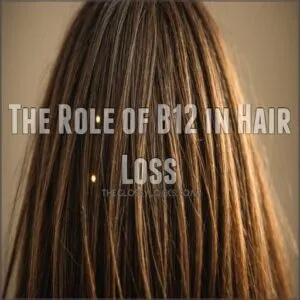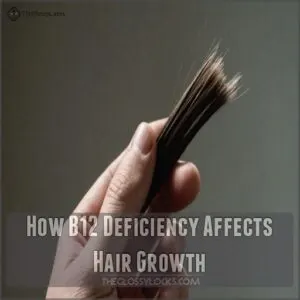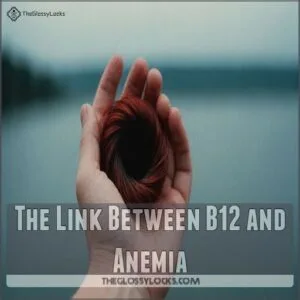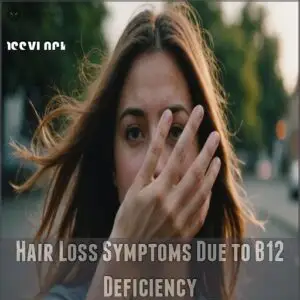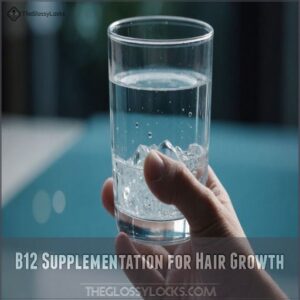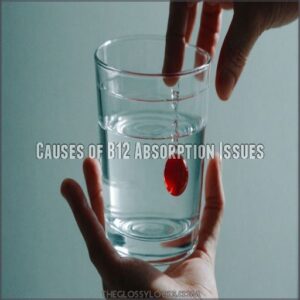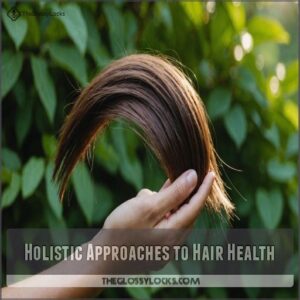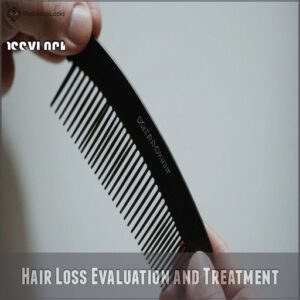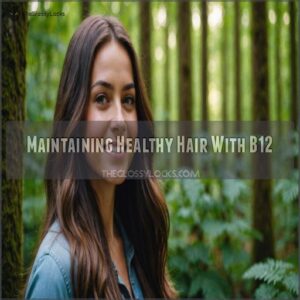This site is supported by our readers. We may earn a commission, at no cost to you, if you purchase through links.
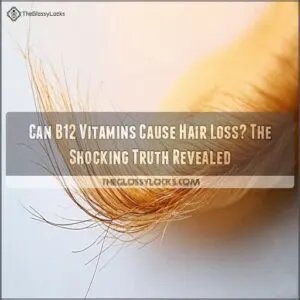 You might wonder, can B12 vitamins cause hair loss?
You might wonder, can B12 vitamins cause hair loss?
Surprisingly, both deficiency and excess of B12 can lead to thinning locks.
While B12 is essential for healthy cell division and the production of red blood cells, lack of it might leave your hair feeling neglected and weak.
Overloading on B12 isn’t a good plan either, as too much could trigger hair shedding.
It’s a tricky balance—much like keeping plants alive, right? So, maintaining ideal levels is key.
Explore how to master the art of balanced B12 intake to keep your hair happy and thriving.
The secrets await those who seek!
Table Of Contents
- Key Takeaways
- The Role of B12 in Hair Loss
- Can B12 Deficiency Cause Hair Loss
- Excessive B12 Intake and Hair Loss
- B12 Supplementation for Hair Growth
- Other B Vitamins Affecting Hair Health
- Dietary Sources of Vitamin B12
- B12 Absorption Issues and Hair Loss
- Holistic Approaches to Hair Health
- Hair Loss Evaluation and Treatment
- Maintaining Healthy Hair With B12
- Frequently Asked Questions (FAQs)
- Can vitamin B12 deficiency cause hair loss?
- What vitamins can be taken to reduce hair loss?
- Does vitamin B2 cause hair loss?
- Does vitamin B12 reduce hair shedding?
- How do I know if my hair loss is B12-related?
- Does vitamin A cause hair loss?
- Can too much B12 make your hair fall out?
- Do B12 and vitamin D cause hair loss?
- How does vitamin B12 hair loss look like?
- Will hair grow back after B12?
- Can stress impact vitamin B12 levels?
- Is B12 hair loss different by age?
- Are vegetarians more prone to B12 deficiency?
- How does B12 affect hair texture?
- Does B12 impact hair color changes?
- Conclusion
Key Takeaways
- You need enough B12 for healthy hair growth, but too much can also cause problems.
- B12 deficiency can lead to hair loss by disrupting cell division and red blood cell production.
- Symptoms of B12 deficiency include fatigue, anemia, and tingling, which can indirectly affect hair health.
- If you are concerned about hair loss, get your B12 levels checked; a blood test can help determine if a deficiency is the cause.
The Role of B12 in Hair Loss
Vitamin B12, essential for cellular metabolism and DNA synthesis, plays a key role in maintaining healthy hair follicles and promoting hair growth.
You’ll discover how this vital nutrient affects your hair’s life cycle and why its deficiency or excess can potentially lead to hair loss, shedding light on the complex relationship between B12 and your luxurious locks.
B12’s Function in Cell Division
Ever wondered how vitamin B12 keeps your locks luscious? It’s all about cell division. B12 plays a key role in DNA replication, ensuring your hair follicles grow strong and healthy. Without enough B12, your hair growth cycle can hit a snag, potentially leading to thinning or loss.
- Boosts DNA synthesis for rapid hair follicle growth
- Supports protein production for stronger strands
- Enhances cell differentiation in hair follicles
- Accelerates the hair growth cycle
- Helps maintain the health of your scalp’s cells
B12’s Impact on Red Blood Cells
Beyond cell division, B12 plays a starring role in your blood’s red carpet.
It’s the VIP guest for red blood cell production and oxygen transport.
Without enough B12, your body throws a fit – churning out larger, immature red blood cells that can’t carry their weight.
This B12 deficiency anemia leaves your hair follicles gasping for air, potentially triggering a hair loss crisis.
It’s like your scalp’s personal energy crisis!
Signs of B12 Deficiency
Detecting B12 deficiency early can save your locks.
You might be running low if you’re experiencing:
- Persistent fatigue that coffee can’t fix
- Anemia symptoms like pale skin and shortness of breath
- Numbness or tingling in hands and feet
- Dizziness or balance issues
These signs shouldn’t be ignored.
While hair loss isn’t directly listed, these symptoms can indirectly affect your mane’s health.
Don’t let B12 deficiency sneak up on you – it’s easier to prevent than to treat.
Signs of Hair Loss Due to B12 Deficiency
Spotting B12 deficiency hair loss can be tricky. You might notice thinning hair or increased shedding. Your scalp may feel different, and you could see patchy hair loss.
B12 deficiency often causes hair breakage, making strands brittle.
If you’re experiencing these symptoms, don’t panic. A blood test can confirm B12 levels, and treatment options are available. Remember, early detection is key to preventing further hair loss and restoring your luscious locks.
Can B12 Deficiency Cause Hair Loss
Vitamin B12 deficiency can have a major impact on hair growth by disrupting cellular division and red blood cell production, potentially leading to hair loss.
Research indicates that insufficient B12 levels may contribute to anemia, which can manifest as thinning hair and premature shedding, underscoring the importance of maintaining adequate B12 intake for good hair health.
How B12 Deficiency Affects Hair Growth
B12 deficiency can wreak havoc on your luscious locks.
This important nutrient plays a key role in cell division and DNA synthesis, essential processes for healthy hair growth.
When you’re running low on B12, your hair follicles can’t function properly, leading to thinning, breakage, and even hair loss.
It’s like trying to grow a garden without proper nutrients – your hair just can’t thrive without this key vitamin.
The Link Between B12 and Anemia
While B12 deficiency can lead to anemia, it’s not your typical iron-deficiency story.
This sneaky vitamin plays a key role in red blood cell production.
When you’re running low on B12, your body can’t keep up with the demand for new cells, leading to megaloblastic anemia.
This condition doesn’t just mess with your energy levels; it can also impact your hair’s growth cycle, potentially causing noticeable hair loss.
Hair Loss Symptoms Due to B12 Deficiency
After pondering anemia’s impact, let’s explore how B12 deficiency sneaks up on your scalp.
Hair loss symptoms include thinning, brittleness, and increased shedding, often accompanied by fatigue, anemia, and scalp changes.
Don’t overlook these signs.
- Thinning hair, especially on the crown
- Brittle, weakened strands
- Increased hair shedding
- Persistent fatigue and tiredness
- Notable scalp discomfort or sensitivity
Excessive B12 Intake and Hair Loss
You’ve probably heard that B12 is essential for your health, but did you know taking too much could be risky?
While high doses of B12 aren’t usually harmful, some evidence suggests excessive consumption might contribute to unexpected hair loss.
Risks of Taking High Doses of B12
You might wonder if too much of a good thing can be harmful. Well, excessive vitamin B12 intake could lead to nausea or even allergic reactions.
Everyone wants luscious locks, but be cautious with doses. For instance, an imbalance of vitamins can affect hair growth, which is why understanding essential vitamins like biotin, vitamin C, and iron is key for maintaining a healthy hair growth cycle.
Let’s break it down:
| Risks | Symptoms |
|---|---|
| Nausea | Digestive discomfort |
| Allergic reactions | Itching or swelling |
| Nervous system issues | Nerve damage concerns |
Hair Loss Due to Overconsumption of B12
Although rare, excessive B12 intake can, surprisingly, trigger hair loss.
B12 toxicity isn’t typically associated with this, but high doses can disrupt your body’s delicate balance.
If you’re concerned about B12 toxicity hair issues, consider products from trusted sources for b12 toxicity hair.
Stick to recommended daily allowances to avoid potential B12 hair loss side effects.
Remember, moderation is key with supplements; always consult your doctor before starting any new regimen.
Understanding safe B12 levels protects your hair and overall health.
B12 Supplementation for Hair Growth
Exploring B12 supplementation for hair growth requires understanding the recommended dosage and being mindful of potential side effects.
It’s essential to follow medical guidance to optimize hair health without adverse outcomes.
Recommended Dosage for Hair Growth
While excessive B12 might cause hair woes, let’s focus on the sweet spot for growth instead: a proper dosage promotes healthy locks.
Experts suggest daily B12 supplementation for good hair health, noting that vegetarians and vegans may require additional support from vegan hair growth supplements.
- Standard dose: 2.4 micrograms.
- Test regularly: Find your perfect match.
- Listen to professionals: everyone’s different.
- Food first: Supplements aren’t meal replacements.
Potential Side Effects of B12 Supplements
Taking B12 supplements mightn’t be a walk in the park.
Some folks encounter side effects like nausea or digestive upset.
Others may face allergic reactions or unexpected headaches.
Watch out for skin reactions too.
Here’s how it all stacks up:
| Symptom | Side Effect |
|---|---|
| Stomach Issues | Nausea, Digestive upset |
| Allergic Reactions | Skin reactions |
| Headaches | Possible pain |
Keep tabs on these if you’re concerned about b12 supplements hair loss.
Other B Vitamins Affecting Hair Health
You’re probably familiar with B12, but other B vitamins like biotin (B7) and folate (B9) also play important roles in maintaining vibrant hair.
While biotin is often hailed for supporting hair growth, folate helps prevent hair loss by ensuring efficient cell division and renewal, keeping your locks looking lush and healthy.
Biotin (B7) and Hair Growth
Curiosity about biotin (B7) and its role in the hair growth cycle is common.
This vitamin helps maintain healthy hair and a biotin deficiency could stall your hair growth plans.
While you can find biotin supplements, you can also get it through a balanced diet or from products designed to support hair growth.
Consider these essential factors:
- Biotin benefits scalp support
- Deficiency leads to dull hair
- Biotin supplements can help
- Key dietary sources improve intake
- Balanced nutrition supports growth
Folate (B9) and Hair Loss Prevention
Imagine your hair growth cycle as a well-oiled machine; folate (B9) keeps it running smoothly.
A folate deficiency might disrupt this process and lead to thinning hair.
Understanding the benefits of folic acid for hair can also play a significant role in keeping your locks healthy.
To combat this, explore folate-rich foods like spinach and beans or consider supplements.
It’s a simple step in hair loss prevention, ensuring your locks remain lush and healthy.
Dietary Sources of Vitamin B12
You’ll find vitamin B12 primarily in animal products like meat, poultry, fish, and dairy.
For vegetarians and vegans, fortified foods such as cereals and plant milks offer alternative sources to meet their needs.
Animal-Based Sources of B12
If you want to keep your B12 levels in check, animal-based sources are a great option.
Enjoy juicy B12-rich meats like beef or lamb, indulge in seafood options such as clams and trout, or savor dairy products and eggs.
Additionally, a balanced diet for hair growth rich in essential nutrients like biotin, keratin, and antioxidants is also important for maintaining healthy hair.
Liver, a top contender, packs a B12 punch, vital for avoiding b12 hair loss and other deficiency-related hair loss causes.
Fortified Foods for Vegetarians and Vegans
Switching from steaks to something gentler on animals, B12 options abound for vegetarians and vegans.
You don’t need to face the hair loss dilemma alone.
Here’s your power trio to keep B12 levels high:
- B12-rich cereals make breakfast easy and delicious.
- Fortified plant milk substitutes dairy with health benefits.
- Nutritional yeast adds cheesy flavor to your vegan dishes.
B12 Absorption Issues and Hair Loss
When B12 absorption becomes problematic, it can result in lower levels of this vital vitamin, potentially triggering hair loss.
Understanding the factors affecting B12 absorption and learning how to enhance it’s essential for maintaining healthy hair.
Causes of B12 Absorption Issues
Autoimmune disorders, such as pernicious anemia, wreak havoc on vitamin B12 absorption because they damage stomach cells that produce intrinsic factor, essential for B12 uptake.
Additionally, stomach surgery and malabsorption syndromes can hamper the digestive process, leading to B12 deficiency.
Even some medications interfere with absorption, further complicating matters and potentially causing symptoms like b12 deficiency hair loss and associated issues.
How to Improve B12 Absorption
Boosting your vitamin B12 absorption can be a game-changer for hair health.
Focus on maintaining a healthy gut, as it plays a key role.
Here’s how you can help:
- Consume B12-rich foods like meat and dairy.
- Support stomach acid levels for better absorption.
- Consider B12 supplements if dietary changes aren’t enough.
These steps could aid in managing hair loss efficiently.
Holistic Approaches to Hair Health
For healthy hair, taking a holistic approach can greatly boost your hair’s health. By balancing nutrition and implementing lifestyle changes, you actively support a robust hair growth cycle.
Balanced Nutrition for Hair Growth
So, you’ve tackled B12 absorption; great job!
Now, let’s talk about your overall diet.
A Hair Growth Diet rich in protein, healthy fats, and Vitamins & Minerals is key.
Think of it like building a strong house – you need the right materials!
Sufficient iron is also important; iron deficiency can cause hair loss.
Don’t forget biotin, another important vitamin.
A balanced approach to nutrition is the best way to support healthy hair growth.
Lifestyle Changes for Healthy Hair
For your hair, small lifestyle tweaks can make a big splash!
Prioritize stress management and sleep hygiene to keep locks healthy.
Embrace scalp care and gentle hair styling to avoid damage.
Consider diet changes to include foods rich in vitamin B12, essential for hair growth.
These habits enhance hair health, combating nutrition-based hair loss.
Hair Loss Evaluation and Treatment
When you’re worried about hair loss, getting a professional evaluation can offer clarity and direction.
Understanding the available treatment options, from topical solutions to nutritional adjustments, empowers you to tackle the issue effectively and regain your confidence.
Getting a Free Hair Loss Evaluation
After embracing balanced nutrition, the next step involves getting a free hair loss evaluation.
Online tests and a doctor’s visit can kickstart this journey.
You’ll receive a thorough hair analysis and expert advice from professionals who understand the nuances of vitamin B12 and hair loss.
This insight is foundational for anyone considering hair restoration or understanding their unique hair transplantation options.
Treatment Options for Hair Loss
Exploring the wide world of hair loss treatments, you’ll find diverse options suited to fit your needs perfectly.
Here’s a handy shortlist:
- Hair Transplants: Revive your locks with advanced, natural-looking procedures.
- Prescription Meds: Combat alopecia with targeted medications.
- Lifestyle Changes: Implement natural remedies and vitamin B12-rich diets for holistic hair restoration.
Explore these paths confidently for the best results!
Maintaining Healthy Hair With B12
To keep your locks looking luscious, B12 is your hair’s best friend, supporting everything from cell division to nutrient absorption.
Preventing hair loss isn’t just about what’s on your plate; it’s about ensuring you’re getting the right B12 levels to keep those strands strong.
Tips for Healthy Hair Growth
Feeling overwhelmed by hair loss treatments?
Let’s switch gears to proactive care.
Incorporate foods rich in omega-3 fatty acids like fatty fish for hair to support hair health.
Promote healthy hair growth with B12 by focusing on a balanced diet rich in vitamins.
Regular scalp massage boosts circulation, aiding nutrient delivery.
Opt for quality hair products designed for your needs.
Don’t forget, managing stress and ensuring good sleep quality are just as important for luscious locks.
How to Prevent Hair Loss With B12
So, you’ve got the healthy hair growth tips down pat. Now, let’s talk about preventing hair loss with vitamin B12. A B12 deficiency can lead to hair loss, so maintaining healthy levels is key.
In addition to maintaining a balanced diet, you can explore B12 hair loss products online, such as those found on B12 hair loss products.
Here’s how you can do it:
- Eat foods rich in B12 (meat, poultry, fish).
- Consider B12 supplements, but talk to your doctor first.
- Make sure proper B12 absorption happens; a healthy gut is essential.
By addressing potential B12 deficiency, you’re actively preventing hair loss and promoting healthy hair growth. It’s a win-win!
Frequently Asked Questions (FAQs)
Can vitamin B12 deficiency cause hair loss?
Imagine this: you’re juggling life like a pro, but did you know a vitamin B12 deficiency can trigger hair loss?
While B12 fuels DNA synthesis and red blood cell production, low levels might affect hair health indirectly.
What vitamins can be taken to reduce hair loss?
To help reduce hair loss, consider taking vitamins like biotin, vitamin D, and iron supplements.
They support hair health and address deficiencies that might contribute to hair issues.
Always consult with a healthcare provider before starting supplements.
Does vitamin B2 cause hair loss?
B vitamin deficiencies, not excesses, are linked to hair loss. Riboflavin (B2) deficiency can contribute, but it’s rarely the sole cause. Don’t worry; make sure you’re eating a balanced diet.
Does vitamin B12 reduce hair shedding?
Vitamin B12 isn’t directly linked to reducing hair shedding, but a deficiency might contribute to hair loss.
Vitamin B12 ensuring adequate levels supports overall health, potentially improving hair strength and minimizing shedding indirectly.
Always consult with a healthcare provider.
How do I know if my hair loss is B12-related?
About 40% of hair loss cases link to nutrient deficiencies.
If you’re losing hair, check for fatigue, pale skin, or tingling — symptoms of B12 deficiency.
A blood test confirms it, restoring control over your hair’s future.
Does vitamin A cause hair loss?
Excessive vitamin A can indeed lead to hair loss.
It’s like giving hair too much of a good thing.
Balance is key; keeping vitamin A levels in check is essential for maintaining healthy hair growth.
Can too much B12 make your hair fall out?
While vitamin B12 is essential for health, there’s no clear evidence linking excessive intake to hair loss.
An imbalance in nutrients can affect hair health, so it’s wise to maintain balanced vitamin levels for overall well-being.
Do B12 and vitamin D cause hair loss?
Think of vitamins like keys that open up health; however, B12 and vitamin D usually don’t cause hair loss.
While vitamin D’s immune role is still studied, B12 mainly supports metabolic and neurological functions, not directly contributing to hair loss.
How does vitamin B12 hair loss look like?
Hair loss from vitamin B12 deficiency usually appears as general thinning across the scalp, without patchy bald spots.
It’s gradual and diffuse, often accompanied by other symptoms like fatigue or neurological issues.
Checking B12 levels helps.
Will hair grow back after B12?
Don’t worry, B12 deficiency can cause hair loss, but treating the deficiency often leads to regrowth.
Your body needs B12 for healthy cell function, including hair follicles.
With sufficient B12, you’ll likely see improvement.
Can stress impact vitamin B12 levels?
Stress can indirectly affect vitamin B12 levels.
While stress doesn’t deplete B12 directly, chronic stress might impact its absorption by affecting gastrointestinal health, potentially leading to deficiencies in some individuals.
Managing stress and ensuring a balanced diet is key.
Is B12 hair loss different by age?
B12 deficiency doesn’t discriminate by age, affecting young and old alike.
However, older folks might be more vulnerable due to absorption issues.
If you’re worried about your hair and nutrient levels, consult your doctor.
Are vegetarians more prone to B12 deficiency?
Vegetarians are more prone to B12 deficiency because this vitamin is primarily found in animal products.
Without careful dietary planning or supplementation, they might miss out on this essential nutrient, affecting overall health and energy levels.
How does B12 affect hair texture?
Did you know about 15% of people experience changes in hair texture due to nutrient deficiencies?
B12 keeps hair healthy by supporting cell growth.
Lack of it can make hair brittle, dull, and prone to breakage.
Does B12 impact hair color changes?
Vitamin B12 doesn’t directly change your hair color, but deficiencies can lead to hair health issues that might indirectly affect color.
Ensuring enough B12 in your diet supports overall hair health, keeping it vibrant and strong.
Conclusion
When it comes to B12 vitamins and hair loss, striking a balance is key—a stitch in time saves nine.
Both deficiency and excess can lead to thinning hair, making it essential to monitor your B12 levels carefully.
Pay attention to symptoms like hair shedding and fatigue, signaling potential imbalances.
By maintaining proper B12 intake through diet or supplements, you can support healthy hair growth.
Remember, keeping your hair happy isn’t just about looks—it’s about overall wellness.

